BMP3004 - Understanding Employee Motivation & Impact of Job Roles
VerifiedAdded on 2022/12/27
|7
|1935
|84
Report
AI Summary
This report explores the factors that motivate employees in the workplace, including rewards, job security, leadership, working environment, development opportunities, discipline, and good wages. It also examines the positive and negative factors experienced by employees in their job roles, such as sales targets, HRM practices, relationship conflicts, economic pressure, and work pressure. The report concludes that understanding and addressing these factors is crucial for enhancing employee productivity, satisfaction, and retention within an organization, contributing to the overall success of the business.
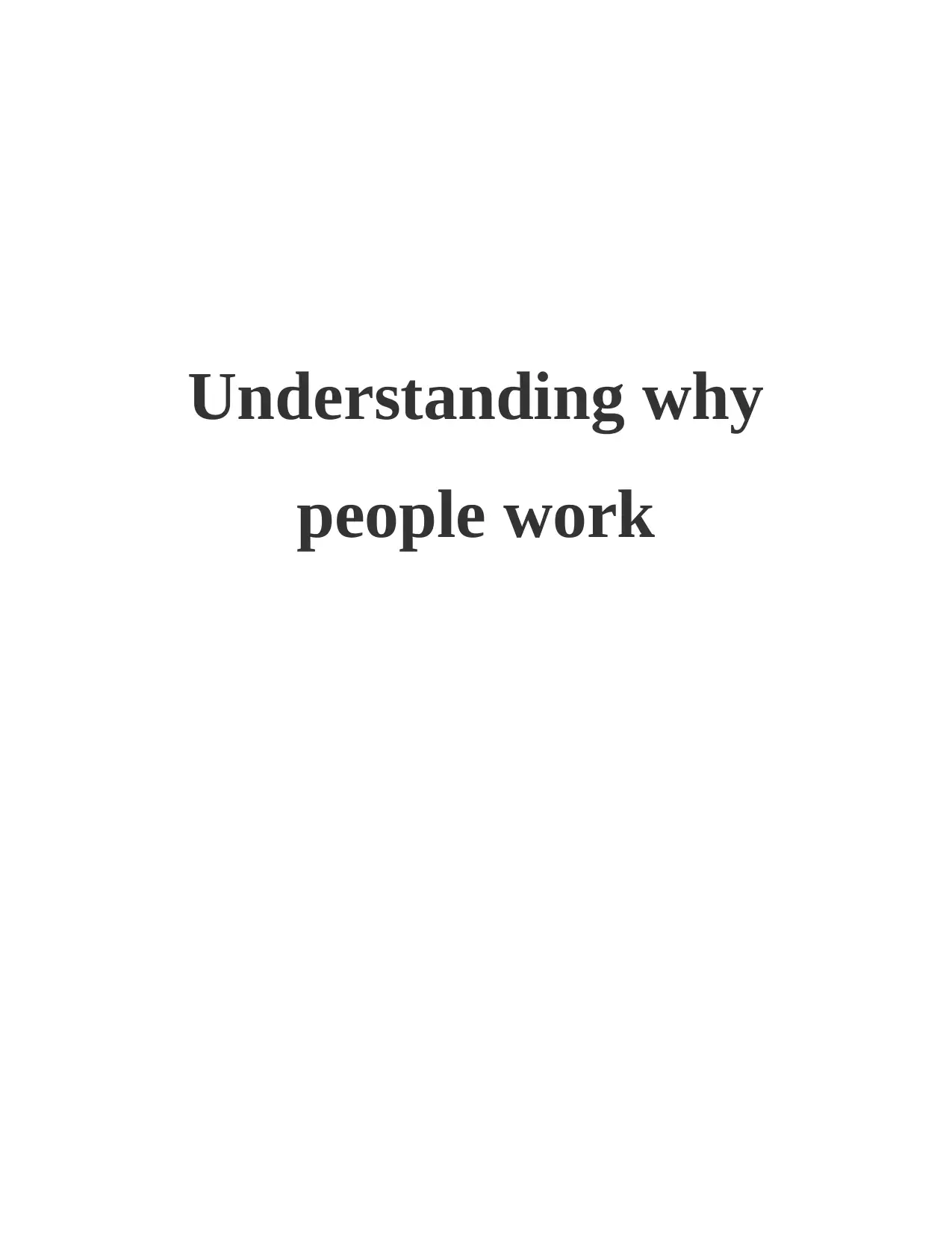
Understanding why
people work
people work
Paraphrase This Document
Need a fresh take? Get an instant paraphrase of this document with our AI Paraphraser
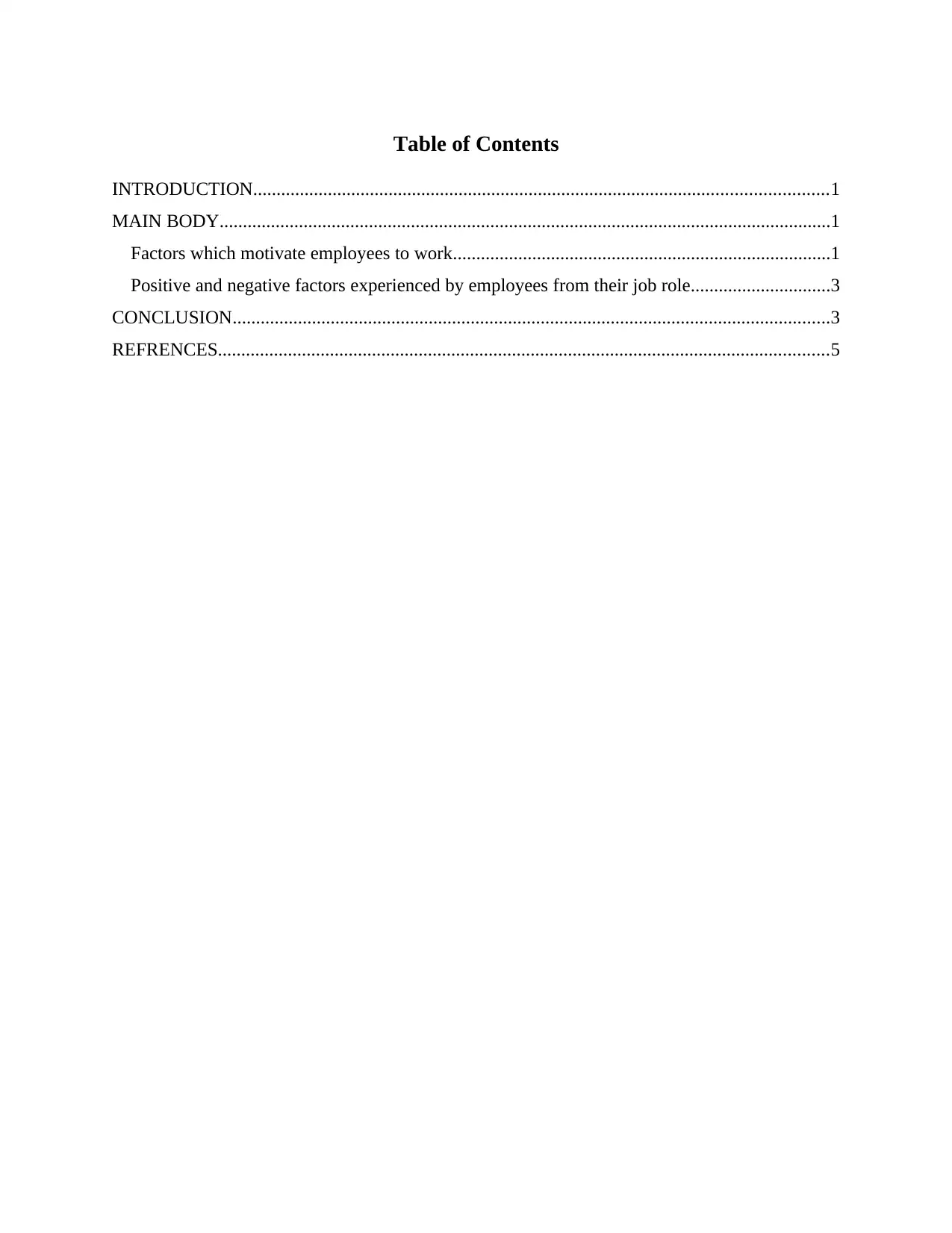
Table of Contents
INTRODUCTION...........................................................................................................................1
MAIN BODY...................................................................................................................................1
Factors which motivate employees to work.................................................................................1
Positive and negative factors experienced by employees from their job role..............................3
CONCLUSION................................................................................................................................3
REFRENCES...................................................................................................................................5
INTRODUCTION...........................................................................................................................1
MAIN BODY...................................................................................................................................1
Factors which motivate employees to work.................................................................................1
Positive and negative factors experienced by employees from their job role..............................3
CONCLUSION................................................................................................................................3
REFRENCES...................................................................................................................................5
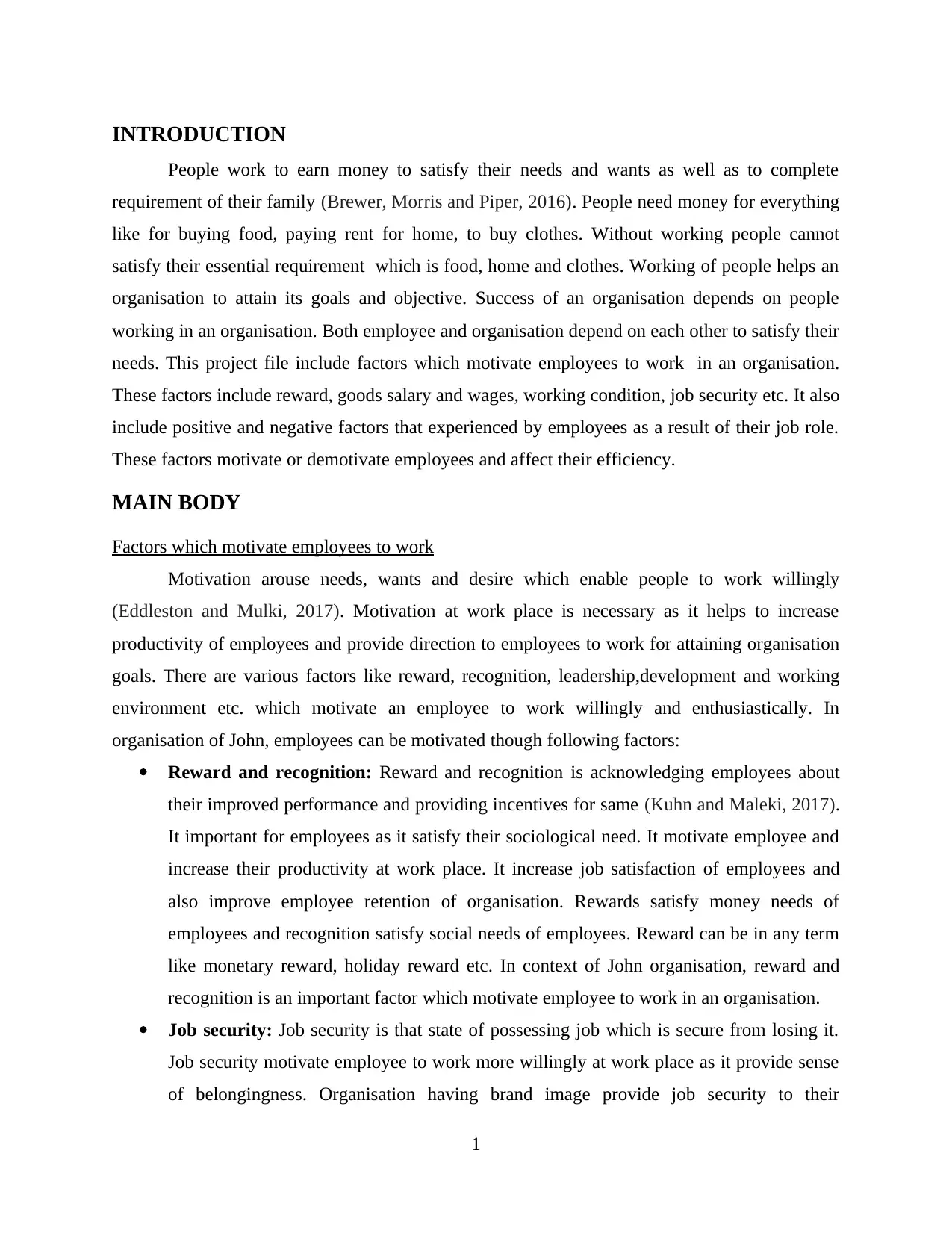
INTRODUCTION
People work to earn money to satisfy their needs and wants as well as to complete
requirement of their family (Brewer, Morris and Piper, 2016). People need money for everything
like for buying food, paying rent for home, to buy clothes. Without working people cannot
satisfy their essential requirement which is food, home and clothes. Working of people helps an
organisation to attain its goals and objective. Success of an organisation depends on people
working in an organisation. Both employee and organisation depend on each other to satisfy their
needs. This project file include factors which motivate employees to work in an organisation.
These factors include reward, goods salary and wages, working condition, job security etc. It also
include positive and negative factors that experienced by employees as a result of their job role.
These factors motivate or demotivate employees and affect their efficiency.
MAIN BODY
Factors which motivate employees to work
Motivation arouse needs, wants and desire which enable people to work willingly
(Eddleston and Mulki, 2017). Motivation at work place is necessary as it helps to increase
productivity of employees and provide direction to employees to work for attaining organisation
goals. There are various factors like reward, recognition, leadership,development and working
environment etc. which motivate an employee to work willingly and enthusiastically. In
organisation of John, employees can be motivated though following factors:
Reward and recognition: Reward and recognition is acknowledging employees about
their improved performance and providing incentives for same (Kuhn and Maleki, 2017).
It important for employees as it satisfy their sociological need. It motivate employee and
increase their productivity at work place. It increase job satisfaction of employees and
also improve employee retention of organisation. Rewards satisfy money needs of
employees and recognition satisfy social needs of employees. Reward can be in any term
like monetary reward, holiday reward etc. In context of John organisation, reward and
recognition is an important factor which motivate employee to work in an organisation.
Job security: Job security is that state of possessing job which is secure from losing it.
Job security motivate employee to work more willingly at work place as it provide sense
of belongingness. Organisation having brand image provide job security to their
1
People work to earn money to satisfy their needs and wants as well as to complete
requirement of their family (Brewer, Morris and Piper, 2016). People need money for everything
like for buying food, paying rent for home, to buy clothes. Without working people cannot
satisfy their essential requirement which is food, home and clothes. Working of people helps an
organisation to attain its goals and objective. Success of an organisation depends on people
working in an organisation. Both employee and organisation depend on each other to satisfy their
needs. This project file include factors which motivate employees to work in an organisation.
These factors include reward, goods salary and wages, working condition, job security etc. It also
include positive and negative factors that experienced by employees as a result of their job role.
These factors motivate or demotivate employees and affect their efficiency.
MAIN BODY
Factors which motivate employees to work
Motivation arouse needs, wants and desire which enable people to work willingly
(Eddleston and Mulki, 2017). Motivation at work place is necessary as it helps to increase
productivity of employees and provide direction to employees to work for attaining organisation
goals. There are various factors like reward, recognition, leadership,development and working
environment etc. which motivate an employee to work willingly and enthusiastically. In
organisation of John, employees can be motivated though following factors:
Reward and recognition: Reward and recognition is acknowledging employees about
their improved performance and providing incentives for same (Kuhn and Maleki, 2017).
It important for employees as it satisfy their sociological need. It motivate employee and
increase their productivity at work place. It increase job satisfaction of employees and
also improve employee retention of organisation. Rewards satisfy money needs of
employees and recognition satisfy social needs of employees. Reward can be in any term
like monetary reward, holiday reward etc. In context of John organisation, reward and
recognition is an important factor which motivate employee to work in an organisation.
Job security: Job security is that state of possessing job which is secure from losing it.
Job security motivate employee to work more willingly at work place as it provide sense
of belongingness. Organisation having brand image provide job security to their
1
⊘ This is a preview!⊘
Do you want full access?
Subscribe today to unlock all pages.

Trusted by 1+ million students worldwide
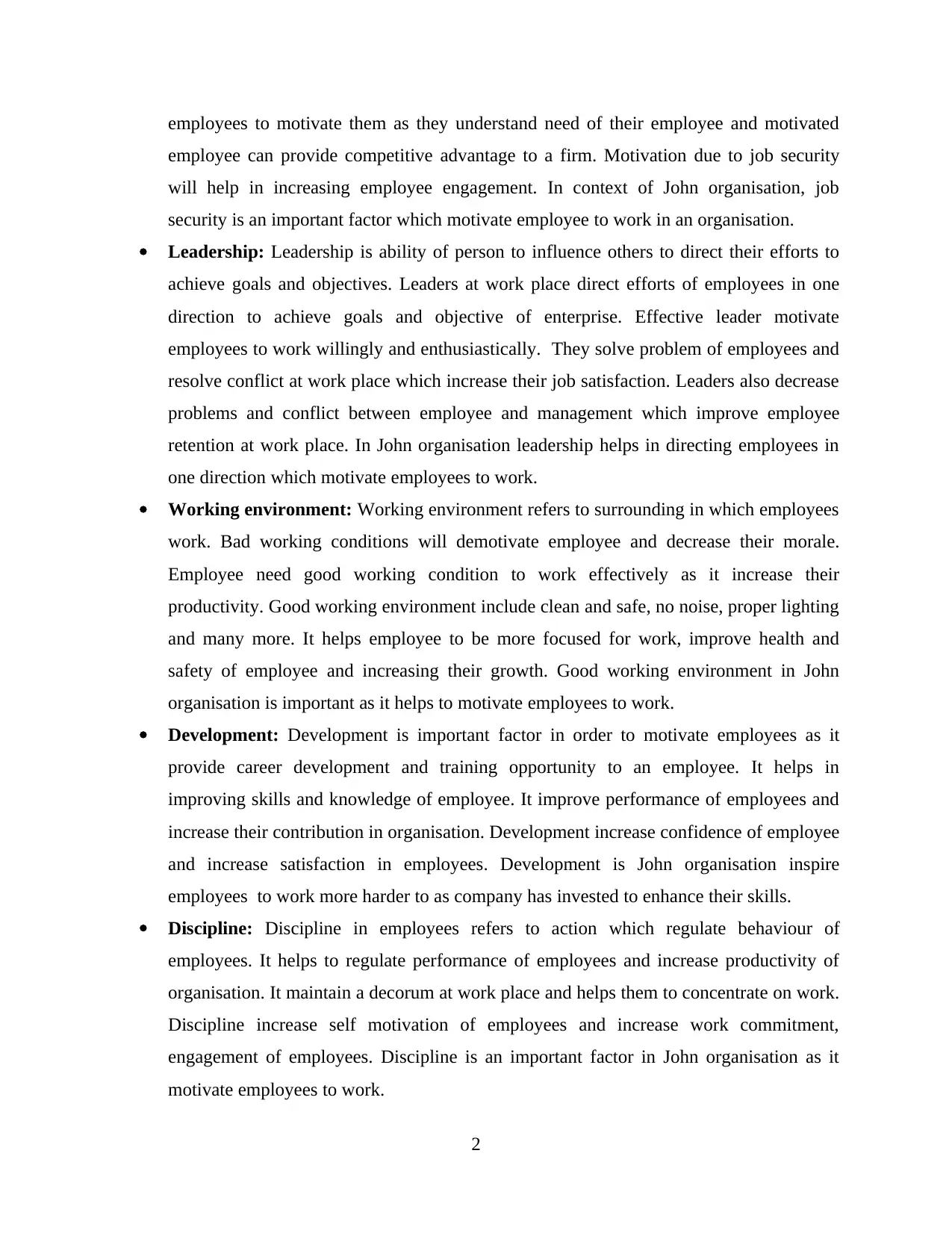
employees to motivate them as they understand need of their employee and motivated
employee can provide competitive advantage to a firm. Motivation due to job security
will help in increasing employee engagement. In context of John organisation, job
security is an important factor which motivate employee to work in an organisation.
Leadership: Leadership is ability of person to influence others to direct their efforts to
achieve goals and objectives. Leaders at work place direct efforts of employees in one
direction to achieve goals and objective of enterprise. Effective leader motivate
employees to work willingly and enthusiastically. They solve problem of employees and
resolve conflict at work place which increase their job satisfaction. Leaders also decrease
problems and conflict between employee and management which improve employee
retention at work place. In John organisation leadership helps in directing employees in
one direction which motivate employees to work.
Working environment: Working environment refers to surrounding in which employees
work. Bad working conditions will demotivate employee and decrease their morale.
Employee need good working condition to work effectively as it increase their
productivity. Good working environment include clean and safe, no noise, proper lighting
and many more. It helps employee to be more focused for work, improve health and
safety of employee and increasing their growth. Good working environment in John
organisation is important as it helps to motivate employees to work.
Development: Development is important factor in order to motivate employees as it
provide career development and training opportunity to an employee. It helps in
improving skills and knowledge of employee. It improve performance of employees and
increase their contribution in organisation. Development increase confidence of employee
and increase satisfaction in employees. Development is John organisation inspire
employees to work more harder to as company has invested to enhance their skills.
Discipline: Discipline in employees refers to action which regulate behaviour of
employees. It helps to regulate performance of employees and increase productivity of
organisation. It maintain a decorum at work place and helps them to concentrate on work.
Discipline increase self motivation of employees and increase work commitment,
engagement of employees. Discipline is an important factor in John organisation as it
motivate employees to work.
2
employee can provide competitive advantage to a firm. Motivation due to job security
will help in increasing employee engagement. In context of John organisation, job
security is an important factor which motivate employee to work in an organisation.
Leadership: Leadership is ability of person to influence others to direct their efforts to
achieve goals and objectives. Leaders at work place direct efforts of employees in one
direction to achieve goals and objective of enterprise. Effective leader motivate
employees to work willingly and enthusiastically. They solve problem of employees and
resolve conflict at work place which increase their job satisfaction. Leaders also decrease
problems and conflict between employee and management which improve employee
retention at work place. In John organisation leadership helps in directing employees in
one direction which motivate employees to work.
Working environment: Working environment refers to surrounding in which employees
work. Bad working conditions will demotivate employee and decrease their morale.
Employee need good working condition to work effectively as it increase their
productivity. Good working environment include clean and safe, no noise, proper lighting
and many more. It helps employee to be more focused for work, improve health and
safety of employee and increasing their growth. Good working environment in John
organisation is important as it helps to motivate employees to work.
Development: Development is important factor in order to motivate employees as it
provide career development and training opportunity to an employee. It helps in
improving skills and knowledge of employee. It improve performance of employees and
increase their contribution in organisation. Development increase confidence of employee
and increase satisfaction in employees. Development is John organisation inspire
employees to work more harder to as company has invested to enhance their skills.
Discipline: Discipline in employees refers to action which regulate behaviour of
employees. It helps to regulate performance of employees and increase productivity of
organisation. It maintain a decorum at work place and helps them to concentrate on work.
Discipline increase self motivation of employees and increase work commitment,
engagement of employees. Discipline is an important factor in John organisation as it
motivate employees to work.
2
Paraphrase This Document
Need a fresh take? Get an instant paraphrase of this document with our AI Paraphraser
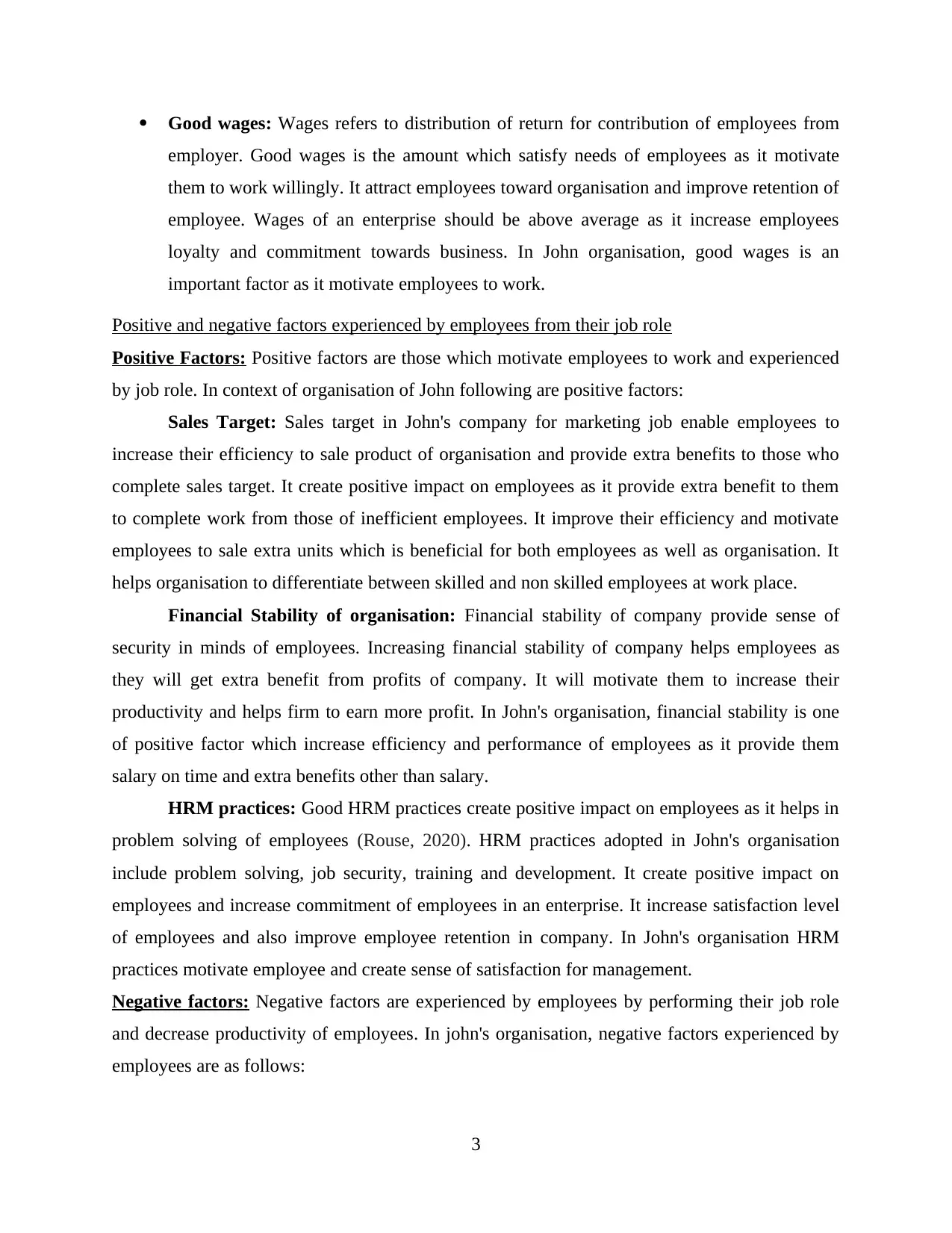
Good wages: Wages refers to distribution of return for contribution of employees from
employer. Good wages is the amount which satisfy needs of employees as it motivate
them to work willingly. It attract employees toward organisation and improve retention of
employee. Wages of an enterprise should be above average as it increase employees
loyalty and commitment towards business. In John organisation, good wages is an
important factor as it motivate employees to work.
Positive and negative factors experienced by employees from their job role
Positive Factors: Positive factors are those which motivate employees to work and experienced
by job role. In context of organisation of John following are positive factors:
Sales Target: Sales target in John's company for marketing job enable employees to
increase their efficiency to sale product of organisation and provide extra benefits to those who
complete sales target. It create positive impact on employees as it provide extra benefit to them
to complete work from those of inefficient employees. It improve their efficiency and motivate
employees to sale extra units which is beneficial for both employees as well as organisation. It
helps organisation to differentiate between skilled and non skilled employees at work place.
Financial Stability of organisation: Financial stability of company provide sense of
security in minds of employees. Increasing financial stability of company helps employees as
they will get extra benefit from profits of company. It will motivate them to increase their
productivity and helps firm to earn more profit. In John's organisation, financial stability is one
of positive factor which increase efficiency and performance of employees as it provide them
salary on time and extra benefits other than salary.
HRM practices: Good HRM practices create positive impact on employees as it helps in
problem solving of employees (Rouse, 2020). HRM practices adopted in John's organisation
include problem solving, job security, training and development. It create positive impact on
employees and increase commitment of employees in an enterprise. It increase satisfaction level
of employees and also improve employee retention in company. In John's organisation HRM
practices motivate employee and create sense of satisfaction for management.
Negative factors: Negative factors are experienced by employees by performing their job role
and decrease productivity of employees. In john's organisation, negative factors experienced by
employees are as follows:
3
employer. Good wages is the amount which satisfy needs of employees as it motivate
them to work willingly. It attract employees toward organisation and improve retention of
employee. Wages of an enterprise should be above average as it increase employees
loyalty and commitment towards business. In John organisation, good wages is an
important factor as it motivate employees to work.
Positive and negative factors experienced by employees from their job role
Positive Factors: Positive factors are those which motivate employees to work and experienced
by job role. In context of organisation of John following are positive factors:
Sales Target: Sales target in John's company for marketing job enable employees to
increase their efficiency to sale product of organisation and provide extra benefits to those who
complete sales target. It create positive impact on employees as it provide extra benefit to them
to complete work from those of inefficient employees. It improve their efficiency and motivate
employees to sale extra units which is beneficial for both employees as well as organisation. It
helps organisation to differentiate between skilled and non skilled employees at work place.
Financial Stability of organisation: Financial stability of company provide sense of
security in minds of employees. Increasing financial stability of company helps employees as
they will get extra benefit from profits of company. It will motivate them to increase their
productivity and helps firm to earn more profit. In John's organisation, financial stability is one
of positive factor which increase efficiency and performance of employees as it provide them
salary on time and extra benefits other than salary.
HRM practices: Good HRM practices create positive impact on employees as it helps in
problem solving of employees (Rouse, 2020). HRM practices adopted in John's organisation
include problem solving, job security, training and development. It create positive impact on
employees and increase commitment of employees in an enterprise. It increase satisfaction level
of employees and also improve employee retention in company. In John's organisation HRM
practices motivate employee and create sense of satisfaction for management.
Negative factors: Negative factors are experienced by employees by performing their job role
and decrease productivity of employees. In john's organisation, negative factors experienced by
employees are as follows:
3
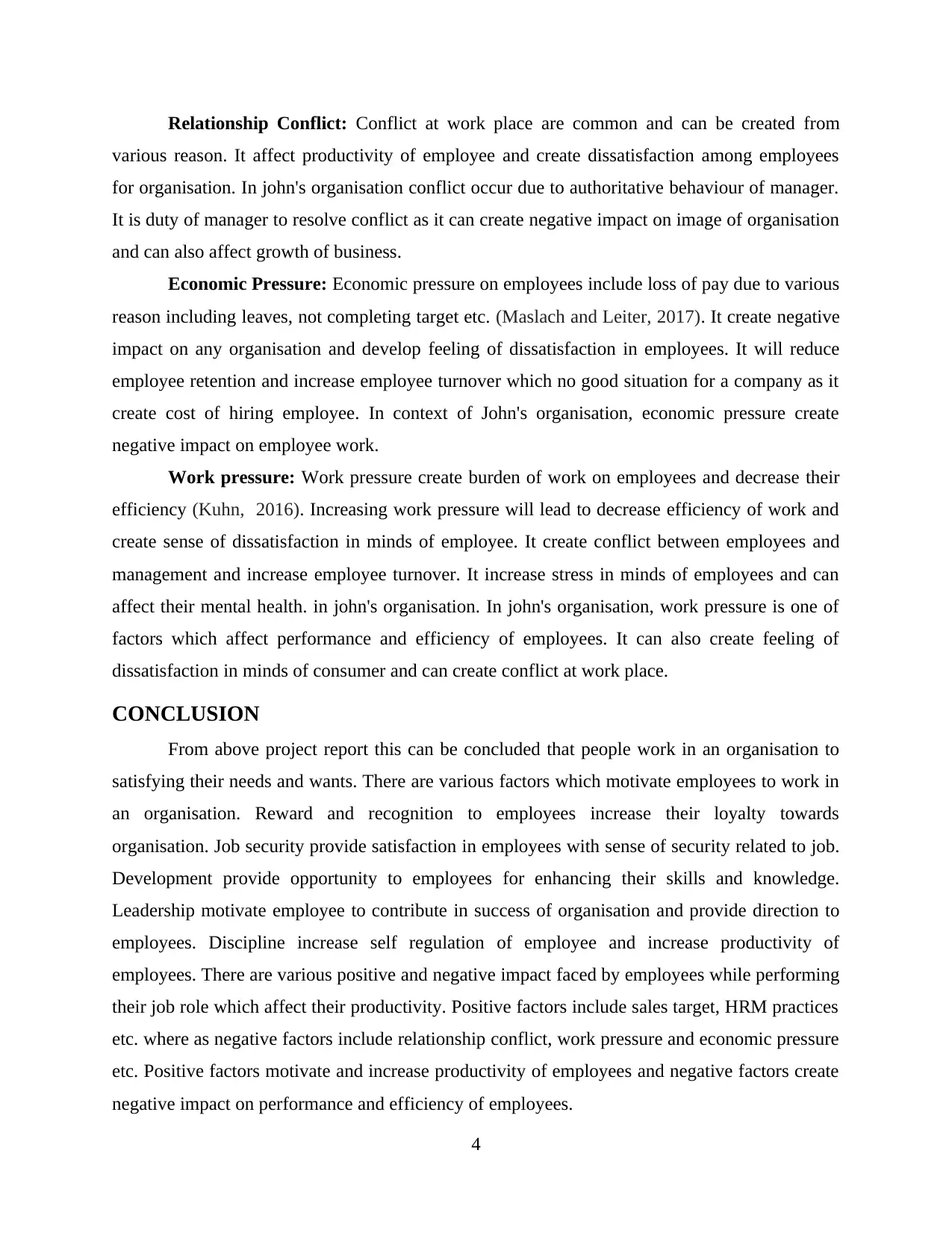
Relationship Conflict: Conflict at work place are common and can be created from
various reason. It affect productivity of employee and create dissatisfaction among employees
for organisation. In john's organisation conflict occur due to authoritative behaviour of manager.
It is duty of manager to resolve conflict as it can create negative impact on image of organisation
and can also affect growth of business.
Economic Pressure: Economic pressure on employees include loss of pay due to various
reason including leaves, not completing target etc. (Maslach and Leiter, 2017). It create negative
impact on any organisation and develop feeling of dissatisfaction in employees. It will reduce
employee retention and increase employee turnover which no good situation for a company as it
create cost of hiring employee. In context of John's organisation, economic pressure create
negative impact on employee work.
Work pressure: Work pressure create burden of work on employees and decrease their
efficiency (Kuhn, 2016). Increasing work pressure will lead to decrease efficiency of work and
create sense of dissatisfaction in minds of employee. It create conflict between employees and
management and increase employee turnover. It increase stress in minds of employees and can
affect their mental health. in john's organisation. In john's organisation, work pressure is one of
factors which affect performance and efficiency of employees. It can also create feeling of
dissatisfaction in minds of consumer and can create conflict at work place.
CONCLUSION
From above project report this can be concluded that people work in an organisation to
satisfying their needs and wants. There are various factors which motivate employees to work in
an organisation. Reward and recognition to employees increase their loyalty towards
organisation. Job security provide satisfaction in employees with sense of security related to job.
Development provide opportunity to employees for enhancing their skills and knowledge.
Leadership motivate employee to contribute in success of organisation and provide direction to
employees. Discipline increase self regulation of employee and increase productivity of
employees. There are various positive and negative impact faced by employees while performing
their job role which affect their productivity. Positive factors include sales target, HRM practices
etc. where as negative factors include relationship conflict, work pressure and economic pressure
etc. Positive factors motivate and increase productivity of employees and negative factors create
negative impact on performance and efficiency of employees.
4
various reason. It affect productivity of employee and create dissatisfaction among employees
for organisation. In john's organisation conflict occur due to authoritative behaviour of manager.
It is duty of manager to resolve conflict as it can create negative impact on image of organisation
and can also affect growth of business.
Economic Pressure: Economic pressure on employees include loss of pay due to various
reason including leaves, not completing target etc. (Maslach and Leiter, 2017). It create negative
impact on any organisation and develop feeling of dissatisfaction in employees. It will reduce
employee retention and increase employee turnover which no good situation for a company as it
create cost of hiring employee. In context of John's organisation, economic pressure create
negative impact on employee work.
Work pressure: Work pressure create burden of work on employees and decrease their
efficiency (Kuhn, 2016). Increasing work pressure will lead to decrease efficiency of work and
create sense of dissatisfaction in minds of employee. It create conflict between employees and
management and increase employee turnover. It increase stress in minds of employees and can
affect their mental health. in john's organisation. In john's organisation, work pressure is one of
factors which affect performance and efficiency of employees. It can also create feeling of
dissatisfaction in minds of consumer and can create conflict at work place.
CONCLUSION
From above project report this can be concluded that people work in an organisation to
satisfying their needs and wants. There are various factors which motivate employees to work in
an organisation. Reward and recognition to employees increase their loyalty towards
organisation. Job security provide satisfaction in employees with sense of security related to job.
Development provide opportunity to employees for enhancing their skills and knowledge.
Leadership motivate employee to contribute in success of organisation and provide direction to
employees. Discipline increase self regulation of employee and increase productivity of
employees. There are various positive and negative impact faced by employees while performing
their job role which affect their productivity. Positive factors include sales target, HRM practices
etc. where as negative factors include relationship conflict, work pressure and economic pressure
etc. Positive factors motivate and increase productivity of employees and negative factors create
negative impact on performance and efficiency of employees.
4
⊘ This is a preview!⊘
Do you want full access?
Subscribe today to unlock all pages.

Trusted by 1+ million students worldwide
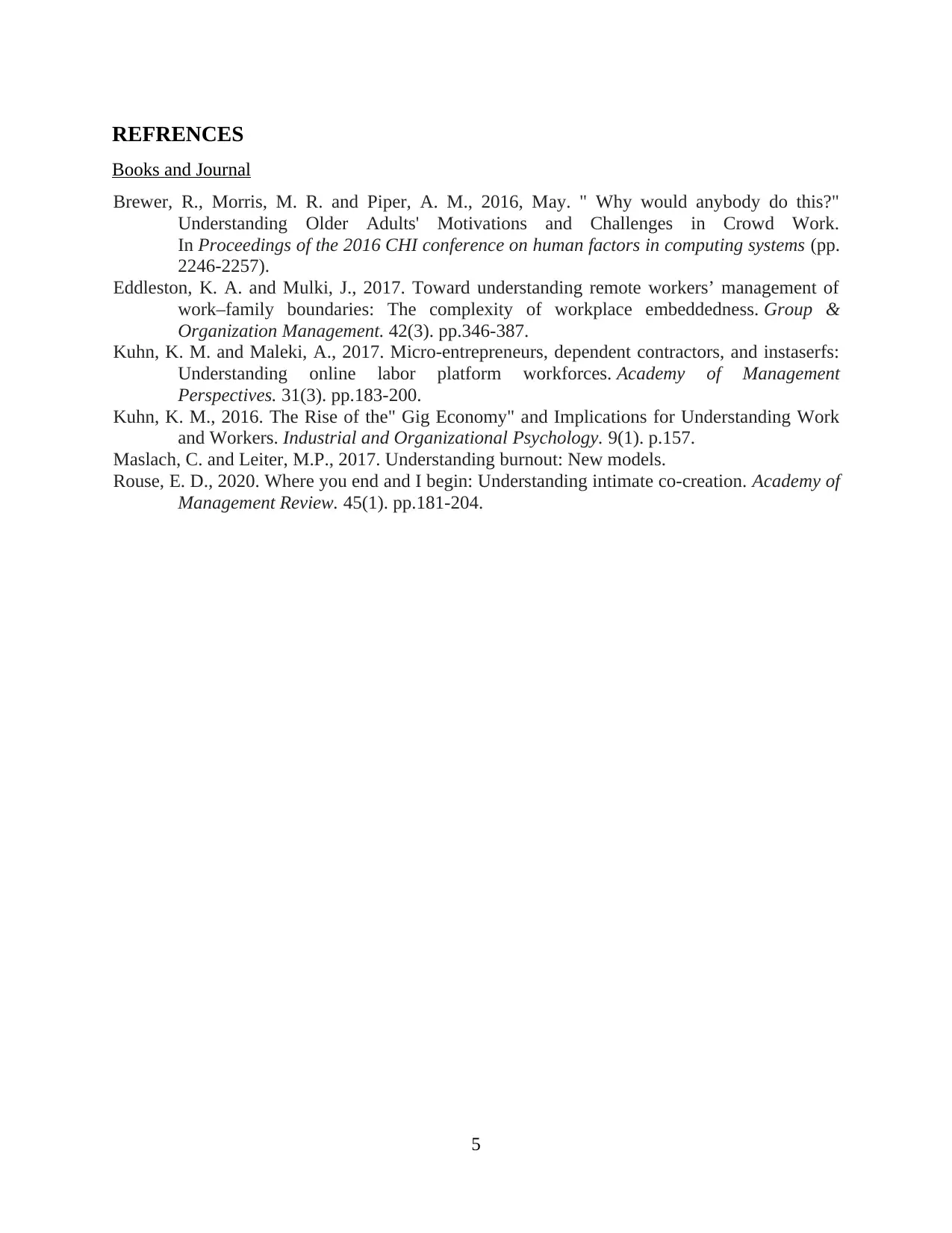
REFRENCES
Books and Journal
Brewer, R., Morris, M. R. and Piper, A. M., 2016, May. " Why would anybody do this?"
Understanding Older Adults' Motivations and Challenges in Crowd Work.
In Proceedings of the 2016 CHI conference on human factors in computing systems (pp.
2246-2257).
Eddleston, K. A. and Mulki, J., 2017. Toward understanding remote workers’ management of
work–family boundaries: The complexity of workplace embeddedness. Group &
Organization Management. 42(3). pp.346-387.
Kuhn, K. M. and Maleki, A., 2017. Micro-entrepreneurs, dependent contractors, and instaserfs:
Understanding online labor platform workforces. Academy of Management
Perspectives. 31(3). pp.183-200.
Kuhn, K. M., 2016. The Rise of the" Gig Economy" and Implications for Understanding Work
and Workers. Industrial and Organizational Psychology. 9(1). p.157.
Maslach, C. and Leiter, M.P., 2017. Understanding burnout: New models.
Rouse, E. D., 2020. Where you end and I begin: Understanding intimate co-creation. Academy of
Management Review. 45(1). pp.181-204.
5
Books and Journal
Brewer, R., Morris, M. R. and Piper, A. M., 2016, May. " Why would anybody do this?"
Understanding Older Adults' Motivations and Challenges in Crowd Work.
In Proceedings of the 2016 CHI conference on human factors in computing systems (pp.
2246-2257).
Eddleston, K. A. and Mulki, J., 2017. Toward understanding remote workers’ management of
work–family boundaries: The complexity of workplace embeddedness. Group &
Organization Management. 42(3). pp.346-387.
Kuhn, K. M. and Maleki, A., 2017. Micro-entrepreneurs, dependent contractors, and instaserfs:
Understanding online labor platform workforces. Academy of Management
Perspectives. 31(3). pp.183-200.
Kuhn, K. M., 2016. The Rise of the" Gig Economy" and Implications for Understanding Work
and Workers. Industrial and Organizational Psychology. 9(1). p.157.
Maslach, C. and Leiter, M.P., 2017. Understanding burnout: New models.
Rouse, E. D., 2020. Where you end and I begin: Understanding intimate co-creation. Academy of
Management Review. 45(1). pp.181-204.
5
1 out of 7
Related Documents
Your All-in-One AI-Powered Toolkit for Academic Success.
+13062052269
info@desklib.com
Available 24*7 on WhatsApp / Email
![[object Object]](/_next/static/media/star-bottom.7253800d.svg)
Unlock your academic potential
Copyright © 2020–2025 A2Z Services. All Rights Reserved. Developed and managed by ZUCOL.



